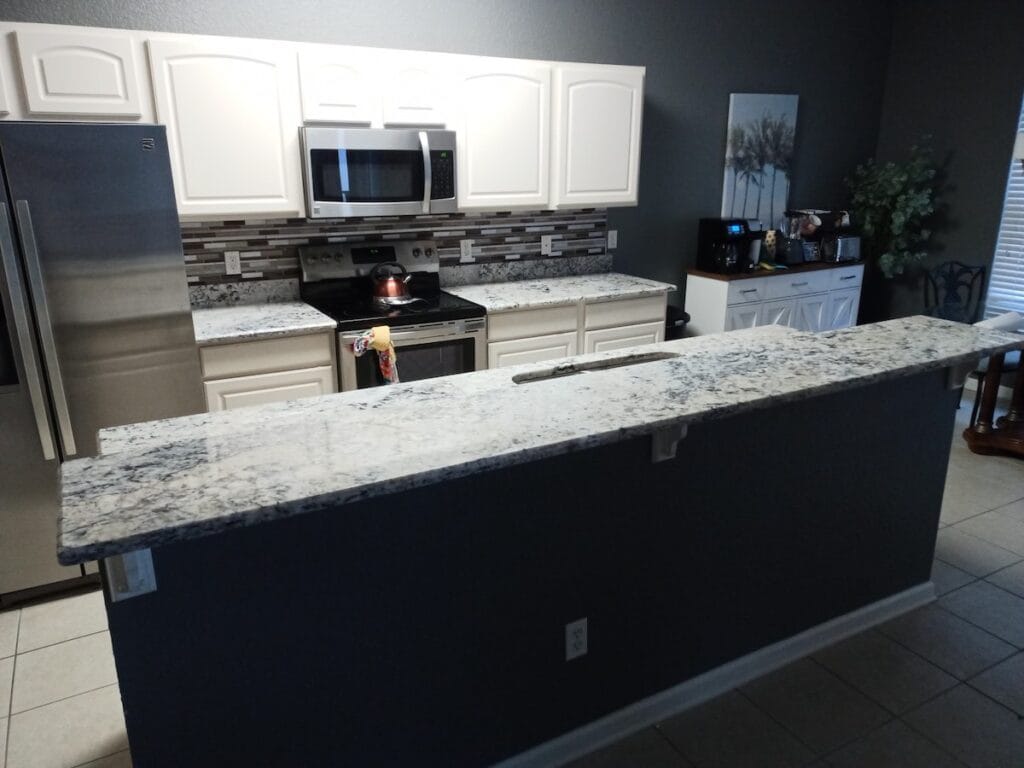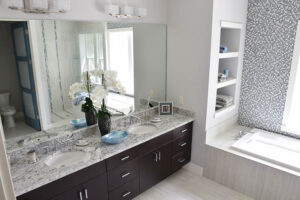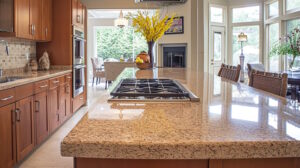Living in Florida comes with its unique set of challenges. The state’s climate can be particularly harsh on home fixtures, especially countertops.
Countertops are a significant investment in any home. They add aesthetic appeal and functionality to your space. But, they require proper care and maintenance to retain their beauty and durability.
In Florida, the combination of high humidity, salt air, and intense UV rays can take a toll on your countertops. This is especially true for bathroom countertops and those made from materials like Quartz.
Understanding how to maintain your countertops in Florida’s climate is crucial. It ensures their longevity and keeps them looking as good as new for years to come.
This comprehensive guide will provide you with all the information you need. From understanding the impact of Florida’s unique climate on different countertop materials to practical tips for long-term care and preservation.
Whether you’re a homeowner, a property manager, or a real estate professional, this guide is for you. It’s time to take countertop maintenance in Florida seriously.

Stay tuned as we delve into the world of countertop maintenance in Florida’s climate. Let’s ensure your countertops stand the test of time and continue to enhance the beauty of your home.
Understanding Florida’s Unique Climate and Your Countertops
Florida’s climate is characterized by high humidity, salt-laden air, and strong sunlight. These factors can significantly affect your countertops. Each material reacts differently, making climate-specific maintenance vital.
Humidity can lead to mold growth, especially in moist areas like bathrooms. This impacts both aesthetics and the integrity of countertops. The persistent exposure to moisture requires a proactive approach.
The salt air in coastal areas accelerates wear and can damage certain materials. Combined with UV exposure, this makes Florida a challenging environment. Understanding these elements helps homeowners make informed decisions about countertop care and selection. Taking preventive measures can enhance durability and appearance, ensuring long-term satisfaction.
Common Countertop Materials in Florida Homes
Choosing the right countertop material is essential for enduring Florida’s climate. Each material comes with benefits and maintenance needs. Understanding these can help guide your decision.
Popular materials include granite, quartz, marble, and laminate. Each has distinct characteristics that appeal to different tastes and budgets. It’s important to consider how these materials perform under Florida’s weather conditions.
Here’s a list of common countertop materials in Florida:
- Granite
- Quartz
- Marble
- Laminate
Homeowners should weigh factors such as durability, aesthetic appeal, and maintenance. Making informed choices can lead to longer-lasting countertops with minimal upkeep. This ensures both functionality and style in your home.
Granite Countertops
Granite countertops are a durable and timeless choice. They are highly resistant to scratches and heat. This makes them perfect for busy kitchens.
However, granite requires sealing to protect against stains and moisture. Regular sealing helps maintain its natural beauty. With proper care, granite can last for decades.
Quartz Countertops
Quartz countertops are known for their durability and low maintenance. They resist scratches, stains, and the effects of humidity. This makes quartz an ideal choice for Florida homes.
Unlike natural stones, quartz does not need sealing. Its engineered nature offers a range of colors and patterns. This provides flexibility for various design preferences.
Marble Countertops
Marble offers a luxurious and elegant appeal. It is softer than granite, offering a more delicate look. However, it requires more care to prevent etching and stains.
Sealing is important to preserve marble in humid climates. Regular maintenance keeps marble looking pristine. Its timeless charm makes the effort worthwhile for many homeowners.
Laminate Countertops
Laminate is a cost-effective option with diverse design choices. It provides an affordable way to refresh kitchen or bathroom spaces. Easy installation makes it a popular choice for DIY enthusiasts.
However, laminate is less durable than stone. It can scratch and chip more easily. But with proper care, it can be a stylish and practical choice for many homes in Florida.
Protecting Countertops from UV Rays and Humidity
Florida’s intense sunlight can fade and damage countertops, making protection essential. UV rays can cause discoloration, especially in materials like wood or dark-colored stones. Use window films or UV-protective coatings to guard against sun damage.
Humidity is another challenge that affects countertop longevity. High moisture levels can lead to warping, mold, and mildew growth. Sealants are vital in forming a barrier against moisture intrusion. Regular application of sealants is crucial, especially for porous materials like granite and marble.
Apart from coatings and sealants, controlling indoor humidity levels is key. Use dehumidifiers to reduce moisture and keep windows closed during humid days. These steps can help prolong the life of your countertops, preserving their beauty and strength.
Preventing Mold and Mildew in Bathrooms
Bathrooms are prone to mold and mildew due to constant moisture. Without proper care, these can become significant problems. It is important to keep bathroom countertops dry to deter mold growth. After use, wipe down surfaces with a dry cloth to remove excess water.
Ventilation plays a crucial role in maintaining a mold-free environment. Use exhaust fans during and after showers to reduce humidity levels. Opening windows when possible can also help improve air circulation.
Regular cleaning with a mild, non-abrasive cleaner is essential. Look for cleaning products specifically designed to combat mold and mildew. Keeping the bathroom clean and dry can significantly minimize the risk of mold and mildew on your bathroom countertops.

Cleaning and Maintenance Routines for Different Countertop Types
Each countertop type requires specific care to ensure longevity and maintain its beauty. Granite countertops, for example, are durable but can be damaged by acidic substances. Clean them regularly with mild soap and water. Avoid using acidic or abrasive cleaners to prevent scratches and dullness.
Quartz countertops are low-maintenance but still need regular attention. Wipe them with a soft cloth and warm water regularly. Avoid placing hot cookware directly on quartz surfaces to prevent damage.
Marble countertops are more sensitive and require gentle care. Use a pH-balanced cleaner to maintain their sheen. Always wipe up spills immediately to avoid staining.
Laminate countertops are budget-friendly and easy to maintain. Clean them with a mild detergent and water. Always use a cutting board to avoid scratches and extend the life of your laminate.
For each countertop type, consider the following routine:
- Use gentle, non-abrasive cleaners.
- Wipe surfaces daily with a soft cloth.
- Address stains quickly to prevent permanent damage.
- Use trivets or mats for hot items.
- Apply sealants as recommended by the manufacturer.
Regularly maintaining your countertops with these routines can keep them looking new and ensure they last for years. Always tailor your cleaning habits to the specific material to maximize their lifespan.
The Importance of Sealants and Proper Application
Sealants play a crucial role in protecting certain countertops, especially porous materials like granite and marble. By preventing liquids from penetrating the surface, sealants reduce the risk of stains and bacteria buildup. This creates a protective barrier that enhances the countertop’s longevity.
Applying sealant properly is essential for achieving its full benefits. It’s important to clean the surface thoroughly before application. Follow the manufacturer’s instructions for best results, typically involving a clean cloth or brush for an even application. Allow sufficient drying time to ensure that the sealant cures effectively.
Regular resealing is also a key maintenance step, especially in Florida’s humid climate. It’s recommended to reseal at least once a year or more frequently in high-use areas. By investing time in proper sealant application, you maintain the aesthetic and functional qualities of your countertops, ensuring they withstand Florida’s challenging conditions.
Best Practices for Dealing with Spills and Stains
Spills are inevitable, but immediate action can prevent stains. Always keep a soft cloth or paper towels handy to blot spills quickly. Avoid wiping as it might spread the liquid and worsen the stain.
Identify the type of spill before cleaning. Acidic spills such as vinegar or citrus can etch certain materials, like marble. For these, a mixture of mild soap and warm water is often effective. Always rinse the area with clean water to remove any residue that might attract dirt or discolor the surface over time.
Stains that have set in can be more challenging. Baking soda paste applied to the stain can work for many surfaces. Leave it on for a few minutes before gently scrubbing in a circular motion. However, avoid abrasive scrubbers on delicate surfaces like quartz and consult the countertop manufacturer’s guidelines when in doubt.

Mitigating the Effects of Salt Air on Coastal Countertops
Coastal homes in Florida face a unique challenge—salt air. This salty environment can wear down countertops, especially metal hardware. To combat this, consider sealing metal parts to prevent corrosion and regularly wipe down surfaces with a damp cloth.
Salt particles can leave a gritty residue, leading to scratches over time. It’s wise to establish a cleaning routine that includes washing surfaces frequently with mild detergent and water. Additionally, using a protective spray designed for seaside properties can offer an extra layer of defense against the corrosive effects of salty air. Regular checks for early signs of damage can help you manage issues before they escalate.
The Role of Proper Installation and Professional Inspections
Proper installation is the foundation of long-lasting countertops. An expert installer ensures materials are well-fitted and supported. This reduces the likelihood of cracks and weaknesses developing over time.
Professional inspections can identify early signs of wear or moisture infiltration. Inspections offer peace of mind, especially in a humid environment like Florida. Detecting issues early can lead to cost-effective solutions and prevent expensive repairs later.
Scheduled inspections should be a routine part of maintenance. They help maintain the integrity and appearance of countertops. Engaging with skilled professionals ensures that both the beauty and durability of your countertops are preserved for years.
Repairing Scratches and Chips: DIY vs. Professional
Scratches and chips can be unsightly on any countertop. Small, surface-level scratches may be repaired with DIY methods. Using a repair kit designed for your countertop material can restore minor damage effectively.
However, deep scratches and chips might require professional attention. Professionals have the tools and expertise needed to handle complex repairs. They can match colors and textures more precisely than most DIY solutions.
Choosing between DIY and professional repair depends on the damage extent and material. For minor issues, a DIY approach may be cost-effective and sufficient. For significant damage, investing in professional repair ensures a higher-quality, long-lasting result. This choice helps maintain both the aesthetics and functionality of your countertops.
Eco-Friendly Cleaning Products for Florida’s Climate
When maintaining countertops in Florida, eco-friendly cleaning products offer many benefits. They are gentle on surfaces while effectively removing dirt. These products often use natural ingredients, which help reduce harm to your countertops and the environment.
Florida’s humid climate makes it essential to choose cleaners that prevent mold and mildew. Eco-friendly options often contain natural antiseptics that address these issues without harsh chemicals. Opting for such products supports a healthier home and contributes to sustainable cleaning practices. Using them regularly can help keep countertops pristine while being kind to the planet.
Seasonal Maintenance Tips for Florida Weather
Florida’s weather varies, affecting countertop maintenance routines. During humid summers, prioritize controlling indoor humidity. Use dehumidifiers or air conditioning to minimize moisture-related issues.
In spring, focus on cleaning and inspecting countertops. Look for signs of mold or mildew that may have developed over the cooler months. Addressing these early helps maintain countertop integrity.
Winter and fall bring milder temperatures, making it ideal for resealing surfaces. Sealants can deteriorate over time, so consider applying a fresh coat during these seasons. This will ensure long-term durability and protection against Florida’s weather extremes.

Addressing Hard Water and Other Florida-Specific Issues
Florida’s water is often hard, posing challenges for countertop maintenance. Mineral deposits can form on surfaces, leading to dullness and spots. To counter this, regularly clean your countertops with a vinegar and water solution. This helps dissolve mineral buildup without damaging surfaces.
Coastal homes face additional issues from salt air. Salt particles can settle on countertops, potentially causing corrosion over time. To mitigate this, wipe down surfaces with a damp cloth frequently. Regular cleaning will remove salt residue and protect your countertops.
Humidity can also lead to mold and mildew, especially in bathrooms. Ensure proper ventilation to keep moisture levels in check. Install exhaust fans or keep windows open to promote airflow. Regular inspections for early signs of mold will help maintain a clean and safe home environment.
Conclusion: The Importance of Consistent Countertop Care
Consistent care is crucial for maintaining your countertops’ beauty and durability. By investing time in regular maintenance, you ensure a longer lifespan for these important surfaces. Simple actions, such as routine cleaning and prompt attention to spills, prevent lasting damage.
Long-term preservation depends on understanding the unique challenges posed by Florida’s climate. Addressing issues like humidity and salt air with proactive measures ensures your countertops remain in top condition. By following the guidelines provided, you can enjoy elegant and functional countertops for years to come. A well-maintained countertop is not just an aesthetic choice, but a smart investment in your home’s value and appeal.
Additional Resources and Professional Services
Finding the right resources is key to maintaining countertops effectively. Local libraries and online forums offer vast information on materials and care methods suitable for Florida’s climate. Utilize these sources to keep your countertop maintenance knowledge updated.
For specialized care, consider hiring professional services. Experienced technicians offer thorough inspections and tailored maintenance strategies. This ensures issues are addressed promptly, preventing costly damage. Investing in expert help can greatly enhance your countertops’ longevity and appearance, making it a wise choice for protecting your home investment.





